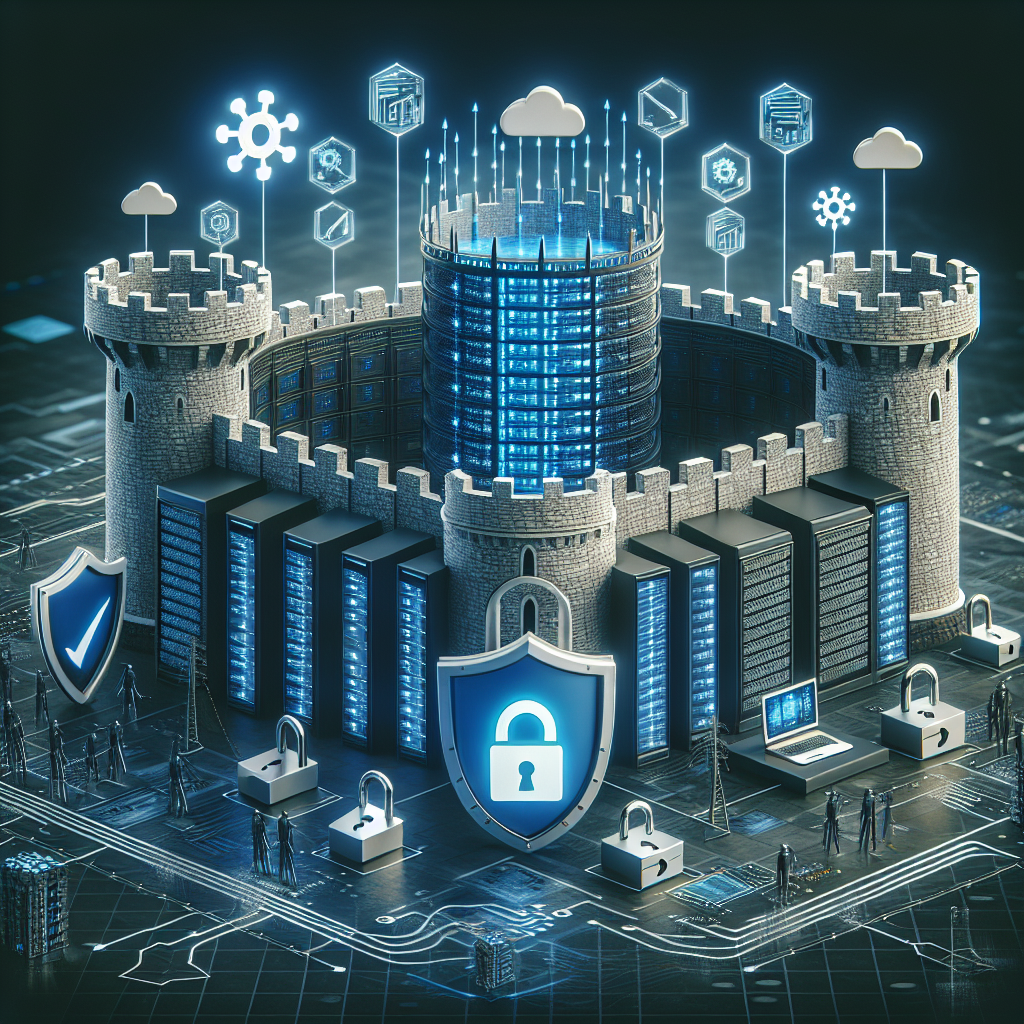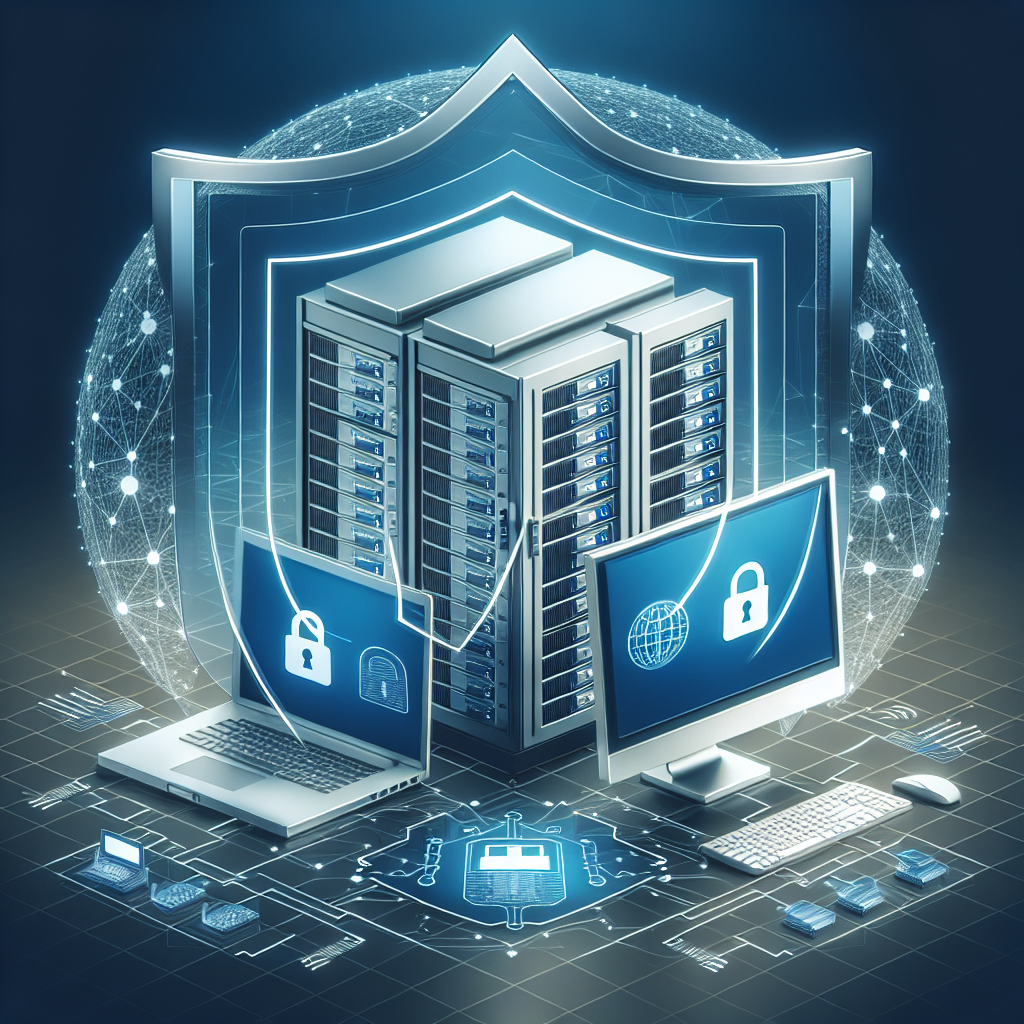Your cart is currently empty!
Tag: Protecting

The Importance of Data Backup and Recovery: Protecting Your Business from Data Loss
In today’s digital age, data is the lifeblood of any business. From customer information to financial records, data plays a crucial role in decision-making and operations. However, data is also vulnerable to various threats such as hardware failure, cyber attacks, natural disasters, and human error. These threats can lead to data loss, which can have serious consequences for a business.This is where data backup and recovery come into play. Data backup involves making copies of your data and storing them in a separate location to ensure that it is safe and accessible in case of a disaster. Data recovery, on the other hand, involves retrieving and restoring lost or corrupted data from backups.
There are several reasons why data backup and recovery are essential for protecting your business from data loss. Firstly, data loss can result in significant financial losses. Losing critical business data can disrupt operations, lead to loss of customers, and damage the reputation of the business. In fact, according to a study by Gartner, the average cost of downtime due to data loss is $5,600 per minute.
Secondly, data loss can also have legal implications. Many businesses are required to comply with data protection regulations such as the General Data Protection Regulation (GDPR) and the Health Insurance Portability and Accountability Act (HIPAA). Failure to protect customer data can result in heavy fines and legal action.
Moreover, data loss can also have a long-term impact on the reputation of a business. Customers trust businesses with their data, and a data breach can lead to loss of trust and loyalty. In today’s competitive market, maintaining a good reputation is crucial for the success of a business.
To prevent data loss and its consequences, businesses should implement a robust data backup and recovery strategy. This includes regularly backing up data, storing backups in secure locations, and testing the recovery process to ensure that data can be restored quickly and efficiently in case of a disaster.
In conclusion, data backup and recovery are essential for protecting your business from data loss. By implementing a comprehensive backup and recovery strategy, businesses can ensure the safety and accessibility of their data, minimize financial losses, comply with regulations, and maintain a good reputation. Don’t wait until it’s too late – invest in data backup and recovery today to safeguard the future of your business.

Protecting Your Data: The Basics of Backup and Recovery
In today’s digital age, our data is more valuable than ever. From important documents and photos to financial information and personal records, we rely on our electronic devices to store and protect a wealth of data. However, with the ever-present threat of cyber attacks, hardware failures, and accidental deletion, it’s crucial to have a backup and recovery plan in place to ensure the safety and security of our information.Backing up your data is the first step in protecting it from loss or corruption. By creating regular backups of your files, you can rest assured that even if your device is compromised, you will still have access to your important information. There are several methods for backing up your data, including external hard drives, cloud storage services, and network-attached storage devices. It’s important to choose a backup solution that fits your needs and preferences, as well as ensuring that your backups are up-to-date and easily accessible.
In addition to backing up your data, having a recovery plan in place is essential in the event of a data loss. Whether it’s due to a malware infection, a hardware malfunction, or accidental deletion, being able to recover your files quickly and efficiently is crucial. This can involve restoring your data from a backup, utilizing data recovery software, or seeking the help of a professional data recovery service.
When it comes to protecting your data, prevention is key. Regularly updating your software, using strong passwords, and being cautious about what you download and click on can help prevent data loss in the first place. However, even with the best precautions in place, accidents can still happen, which is why having a solid backup and recovery plan is essential.
In conclusion, protecting your data is a critical aspect of digital security in today’s world. By implementing a backup and recovery plan that fits your needs and preferences, you can safeguard your important information from loss or corruption. Remember, it’s better to be safe than sorry when it comes to your data, so take the time to establish a backup and recovery strategy that works for you.

Cybersecurity: Essential IT Solutions for Protecting Your Data
In today’s digital age, cybersecurity has become more important than ever before. With hackers constantly looking for ways to access sensitive information, it is crucial for businesses to invest in robust IT solutions to protect their data.One of the most essential IT solutions for protecting data is a strong firewall. A firewall acts as a barrier between your internal network and external threats, such as malware and hackers. By monitoring and controlling incoming and outgoing network traffic, a firewall helps to prevent unauthorized access to your data.
Another crucial IT solution for data protection is encryption. Encryption converts data into a code that can only be deciphered by authorized users with the appropriate decryption key. This helps to ensure that even if hackers were able to access your data, they would not be able to read or use it.
Regularly updating software and operating systems is also essential for data security. Software updates often include patches for security vulnerabilities, so failing to update can leave your systems exposed to potential threats. By staying up-to-date with software updates, you can minimize the risk of data breaches.
Implementing multi-factor authentication is another important IT solution for protecting data. Multi-factor authentication requires users to verify their identity through multiple methods, such as a password and a one-time code sent to their phone. This adds an extra layer of security to prevent unauthorized access to sensitive data.
Regularly backing up data is also crucial for data protection. In the event of a cyberattack or data breach, having backups of your data ensures that you can quickly restore your systems and minimize the impact of the attack.
Overall, investing in these essential IT solutions is crucial for protecting your data and safeguarding your business against cyber threats. By implementing strong firewalls, encryption, software updates, multi-factor authentication, and regular data backups, you can significantly reduce the risk of data breaches and keep your sensitive information safe from hackers.

Enhancing Cybersecurity Through IT Outsourcing: Strategies for Protecting Your Data
In today’s digital age, cybersecurity is more important than ever. With the increasing number of cyber threats and attacks, businesses need to prioritize their data protection strategies. One effective way to enhance cybersecurity is through IT outsourcing. By partnering with a reputable IT outsourcing provider, businesses can benefit from advanced security measures and expertise to protect their valuable data.There are several strategies that businesses can implement to enhance cybersecurity through IT outsourcing. One of the key strategies is to conduct a thorough risk assessment. By identifying potential vulnerabilities and threats, businesses can develop a comprehensive cybersecurity plan that addresses their specific needs. IT outsourcing providers can assist in conducting risk assessments and implementing appropriate security measures to mitigate these risks.
Another important strategy is to implement strong access controls. By limiting access to sensitive data and systems, businesses can reduce the risk of unauthorized access and data breaches. IT outsourcing providers can help businesses set up secure access controls, such as multi-factor authentication and encryption, to protect their data from cyber threats.
Regular monitoring and analysis of security logs is also crucial for enhancing cybersecurity. IT outsourcing providers can assist businesses in monitoring their networks for suspicious activities and responding to security incidents in a timely manner. By analyzing security logs and identifying potential threats, businesses can proactively protect their data from cyber attacks.
Regular security training and awareness programs are essential for ensuring that employees are knowledgeable about cybersecurity best practices. IT outsourcing providers can help businesses develop and implement training programs to educate employees about the importance of data security and how to prevent cyber threats.
In addition to these strategies, businesses can also benefit from outsourcing cybersecurity management to a third-party provider. IT outsourcing providers can offer round-the-clock monitoring and support to ensure that businesses’ data is protected at all times. By outsourcing cybersecurity management, businesses can focus on their core operations while leaving the technical aspects of cybersecurity to experts.
Overall, enhancing cybersecurity through IT outsourcing is a cost-effective and efficient way for businesses to protect their data from cyber threats. By implementing the strategies mentioned above and partnering with a reputable IT outsourcing provider, businesses can strengthen their cybersecurity defenses and safeguard their valuable data. Remember, investing in cybersecurity is an investment in the future success and security of your business.

The Role of Managed Service Providers in Cybersecurity: Protecting Your Business from Threats
In today’s digital age, cybersecurity is more important than ever. With the rise of cyber threats such as ransomware, phishing attacks, and data breaches, businesses need to take proactive measures to protect their sensitive information and assets. One way to do this is by enlisting the help of managed service providers (MSPs) who specialize in cybersecurity.MSPs play a crucial role in helping businesses defend against cyber threats. They offer a range of services, including threat monitoring, vulnerability assessments, incident response, and security training for employees. By outsourcing their cybersecurity needs to an MSP, businesses can benefit from the expertise and resources of a dedicated team of professionals who are trained to identify and mitigate security risks.
One of the key advantages of working with an MSP is that they can provide around-the-clock monitoring of your systems and networks. This proactive approach allows them to detect and respond to potential threats before they have a chance to cause harm. By having a team of experts constantly monitoring your systems, you can have peace of mind knowing that your business is protected from cyber attacks.
Another benefit of working with an MSP is that they can help businesses stay compliant with industry regulations and standards. Many industries, such as healthcare and finance, have strict data security requirements that businesses must adhere to in order to avoid costly fines and penalties. MSPs can help businesses navigate these regulations and ensure that they are following best practices for data security.
In addition, MSPs can also provide businesses with access to the latest cybersecurity tools and technologies. Cyber threats are constantly evolving, so it’s important to have the most up-to-date security measures in place to protect your business. MSPs can help businesses stay ahead of the curve by implementing cutting-edge security solutions that are tailored to their specific needs.
Overall, the role of managed service providers in cybersecurity is crucial for businesses looking to protect themselves from cyber threats. By partnering with an MSP, businesses can benefit from expert guidance, proactive monitoring, and access to the latest security technologies. With cyber attacks on the rise, it’s more important than ever for businesses to prioritize their cybersecurity efforts and invest in the protection of their sensitive information and assets.

Protecting Your Data: The Importance of Cybersecurity IT Solutions
In today’s digital age, protecting your data has never been more important. With the increasing number of cyber threats and attacks, it is crucial for businesses and individuals to invest in cybersecurity IT solutions to safeguard their information.Cybersecurity IT solutions encompass a range of tools and techniques designed to protect data from unauthorized access, theft, or damage. These solutions include firewalls, antivirus software, encryption, network monitoring, and intrusion detection systems, among others.
One of the main reasons why cybersecurity IT solutions are so important is because of the growing number of cyber threats that organizations face. Hackers and cybercriminals are constantly evolving their tactics and techniques to exploit vulnerabilities in systems and networks. Without proper protection in place, businesses risk losing sensitive data, intellectual property, and financial information.
In addition to external threats, organizations also need to be mindful of internal risks such as employee negligence or malicious intent. Cybersecurity IT solutions can help prevent unauthorized access to data and ensure that only authorized personnel are able to access sensitive information.
Furthermore, complying with regulations such as the General Data Protection Regulation (GDPR) and the Health Insurance Portability and Accountability Act (HIPAA) requires organizations to implement robust cybersecurity measures to protect personal data and ensure privacy.
Investing in cybersecurity IT solutions can also help businesses build trust with their customers. In an era where data breaches are becoming increasingly common, customers are more concerned than ever about the security of their personal information. By demonstrating a commitment to protecting data, businesses can enhance their reputation and build brand loyalty.
Overall, the importance of cybersecurity IT solutions cannot be overstated. By investing in the right tools and techniques, organizations can protect their data, minimize the risk of cyber attacks, and ensure compliance with regulations. In today’s interconnected world, cybersecurity should be a top priority for businesses of all sizes.

Cybersecurity and IT Consulting: Protecting Your Business from Threats
In today’s digital age, cybersecurity is more important than ever for businesses of all sizes. With the increasing number of cyber threats and attacks targeting companies, it is crucial for organizations to take proactive measures to protect their sensitive data and information. This is where IT consulting comes in.IT consulting firms specialize in providing expert advice and guidance on cybersecurity best practices, helping businesses implement robust security measures to safeguard their networks, systems, and data from potential threats. These firms have the expertise and experience to assess an organization’s current security posture, identify vulnerabilities, and recommend solutions to mitigate risks.
One of the key benefits of working with an IT consulting firm is access to a team of professionals who are well-versed in the latest cybersecurity trends and technologies. These experts can help businesses stay ahead of cyber threats by implementing proactive security measures such as firewalls, intrusion detection systems, encryption, and multi-factor authentication.
Additionally, IT consulting firms can provide ongoing monitoring and support to ensure that a business’s security measures are effective and up-to-date. This can help organizations detect and respond to security incidents in a timely manner, minimizing the impact of a potential breach on their operations and reputation.
Furthermore, IT consulting firms can also help businesses comply with industry regulations and standards related to cybersecurity, such as the General Data Protection Regulation (GDPR) and the Payment Card Industry Data Security Standard (PCI DSS). By ensuring compliance with these regulations, organizations can avoid costly fines and penalties for data breaches.
In conclusion, cybersecurity and IT consulting are essential for protecting businesses from cyber threats. By partnering with an IT consulting firm, organizations can strengthen their security posture, reduce the risk of data breaches, and ensure compliance with industry regulations. Investing in cybersecurity is not only a smart business decision but also a necessary one in today’s digital landscape.

Protecting Your Business: The Essentials of Disaster Recovery Planning
Disasters can strike at any time, and they can have devastating effects on businesses of all sizes. From natural disasters like hurricanes and earthquakes to cyberattacks and data breaches, there are many potential threats that can disrupt your business operations and put your company at risk. That’s why it’s essential to have a disaster recovery plan in place to protect your business and ensure that you can bounce back quickly in the event of a disaster.A disaster recovery plan is a comprehensive strategy that outlines how your business will respond to and recover from a disaster. It includes procedures for minimizing damage, preserving data, and restoring operations as quickly as possible. Without a solid disaster recovery plan in place, your business could face serious consequences, such as financial losses, damage to your reputation, and even the risk of closure.
So, what are the essentials of disaster recovery planning? Here are some key components to consider when creating your plan:
1. Identify potential risks: The first step in creating a disaster recovery plan is to identify the potential risks that could impact your business. This could include natural disasters like floods, fires, and earthquakes, as well as man-made disasters like cyberattacks and data breaches. By understanding the risks that your business faces, you can develop a plan that addresses these specific threats.
2. Develop a communication plan: Communication is key during a disaster, so it’s important to have a clear and effective communication plan in place. This should include contact information for key personnel, vendors, customers, and other stakeholders, as well as protocols for keeping everyone informed and updated during a crisis.
3. Back up your data: Data is one of the most valuable assets of any business, so it’s crucial to regularly back up your data and store it in a secure location. This will ensure that you can quickly recover your data in the event of a disaster, minimizing downtime and preventing loss of critical information.
4. Establish a recovery team: Designate a team of employees who will be responsible for implementing your disaster recovery plan. This team should be trained on the plan and be ready to act quickly in the event of a disaster. Assign specific roles and responsibilities to ensure that everyone knows what to do during a crisis.
5. Test and update your plan regularly: A disaster recovery plan is only effective if it’s regularly tested and updated. Conduct regular drills and simulations to ensure that your plan is up to date and that your team is prepared to respond to a disaster. Make any necessary revisions based on feedback from these tests and updates to your business operations.
In conclusion, disaster recovery planning is essential for protecting your business from potential threats and ensuring that you can recover quickly in the event of a disaster. By identifying potential risks, developing a communication plan, backing up your data, establishing a recovery team, and testing and updating your plan regularly, you can minimize the impact of a disaster on your business and keep your operations running smoothly. Don’t wait until it’s too late – start creating your disaster recovery plan today to protect your business for the future.

Data Backup and Recovery: A Comprehensive Guide to Protecting Your Information
In today’s digital age, data backup and recovery are crucial aspects of protecting important information. Whether you’re a business owner or an individual, having a plan in place to safeguard your data is essential to prevent loss and ensure that you can quickly recover in the event of a disaster.Data backup involves making copies of your files and storing them in a secure location separate from your primary system. This ensures that if your computer or server crashes, or if you fall victim to a cyber-attack or natural disaster, you can easily retrieve your data and continue operating as usual. There are several methods of backing up data, including cloud storage, external hard drives, and network-attached storage devices.
When it comes to data recovery, having a reliable system in place is key to minimizing downtime and preventing significant loss. Data recovery involves retrieving your backed-up files and restoring them to their original state. This process can be done manually or automated, depending on the complexity of your backup system.
It’s important to regularly schedule backups and test your data recovery plan to ensure that it works effectively. This includes verifying that your backups are complete and up to date, and that you can successfully recover your files in the event of a crisis.
In addition to regularly backing up your data, it’s also essential to implement security measures to protect your information from cyber threats. This includes using strong passwords, encryption, and firewalls to prevent unauthorized access to your files.
Overall, data backup and recovery are critical components of safeguarding your information and ensuring business continuity. By developing a comprehensive plan and regularly testing it, you can protect your data and minimize the impact of potential disasters. Remember, it’s better to be safe than sorry when it comes to protecting your valuable information.

Cybersecurity Essentials: Protecting Your Business with IT Solutions
In today’s digital age, cybersecurity has become a crucial aspect of running a successful business. With cyber threats constantly evolving and becoming more sophisticated, it is essential for companies to prioritize their cybersecurity measures in order to protect their sensitive data and information. This is where IT solutions come into play, providing businesses with the tools and technologies needed to safeguard their systems and networks from potential cyber attacks.One of the key cybersecurity essentials for businesses is endpoint security. Endpoint security refers to the protection of network endpoints, such as laptops, smartphones, and other devices, from malicious cyber threats. This is especially important for businesses that have employees working remotely or using their own devices for work purposes. By implementing endpoint security solutions, businesses can ensure that all devices connected to their network are secure and protected from cyber attacks.
Another essential aspect of cybersecurity for businesses is network security. Network security involves the implementation of various technologies and processes to protect a company’s network infrastructure from unauthorized access, data breaches, and other cyber threats. This includes firewalls, intrusion detection systems, and virtual private networks (VPNs) to create a secure network environment for businesses to operate in.
In addition to endpoint and network security, businesses should also consider implementing strong access control measures to protect their sensitive data. Access control involves restricting access to certain areas of a network or specific information to authorized individuals only. This can be achieved through the use of passwords, biometric authentication, and multi-factor authentication to ensure that only authorized users have access to sensitive data.
Furthermore, businesses should regularly update their software and systems to patch any vulnerabilities that may be exploited by cyber attackers. This includes installing security updates and patches for operating systems, applications, and other software to prevent cyber attacks and data breaches.
Overall, cybersecurity is a critical component of running a successful business in today’s digital landscape. By implementing IT solutions such as endpoint security, network security, access control, and regular software updates, businesses can protect their sensitive data and information from cyber threats and ensure the security of their systems and networks.
In conclusion, cybersecurity essentials are crucial for protecting your business from cyber threats and data breaches. By investing in IT solutions and implementing strong cybersecurity measures, businesses can safeguard their sensitive data and information and maintain the trust of their customers and clients. Remember, it’s better to be proactive and prevent cyber attacks than to deal with the aftermath of a data breach.
